Self-Control
The Last Thing You Need to Know About Ego Depletion
What the rise and fall of ego depletion says about motivation—and research.
Posted December 28, 2020 Reviewed by Matt Huston
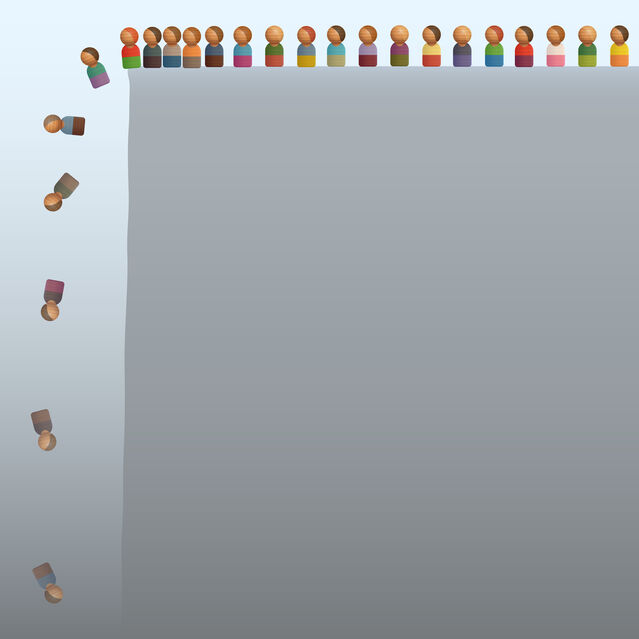
You’ve probably heard of the psychological concept of ego depletion. After exerting self-control doing one thing, the theory goes, you are then less able to use self-control for other things, even in a different area of your life. If you’ve been working all day to resist eating chocolate because you're on a diet, you're more vulnerable to lapses in self-control that evening.
This is a provocative idea and it took off quickly because it's so intuitive. Who hasn’t had the experience of wanting to flop down on the couch after a hard day instead of going to the gym or for a jog? But here’s the problem: scientists have been unable to find consistent support for it in the data. Despite how it feels at times, a compelling new study shows that motivation simply doesn’t run out like fuel in a tank.
Motivation is not a limited resource. Research on ego depletion indicates that motivation may be, instead, almost entirely subjective.
The rise and fall of ego depletion also illustrates a larger tragedy of modern psychology. We have become so obsessed with chasing down quirky purported features of human behavior that we have lost sight of the big questions. When there is still so much to be discovered about a topic such as motivation, we do a disservice to science when we follow the narrow path laid down by others rather than venturing in a new direction into the vast unexplored space.
Quite a bit has been written since the publication of the classic paper, “Ego depletion: Is the active self a limited resource?” by Roy Baumeister and colleagues in 1998. The paper has been cited more than 6,200 times and is the subject of dozens of meta-analyses. A tally in 2015 identified somewhere around 300 ego depletion experiments in more than 140 published papers. Psychologists flocked to this idea and invested countless person-hours in testing it.
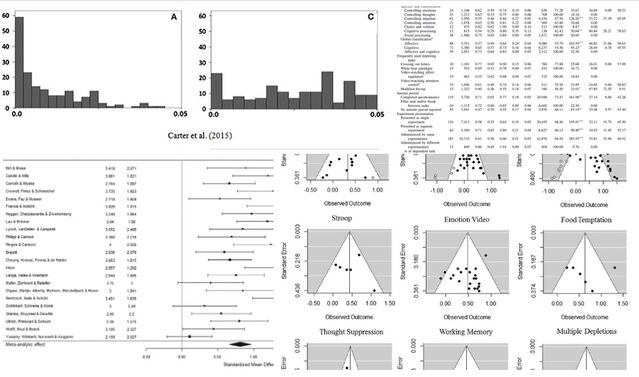
All of this work persisted despite simmering doubts about the ego depletion effect. One of my earliest conference memories was talking to some other self-control researchers about how we all had tried to replicate ego depletion in our labs and none of us could. The first published failure to replicate the effect came out in 2004. Doubts lingered within a small corner of the scientific community, but people outside that circle had little reason to question ego depletion.
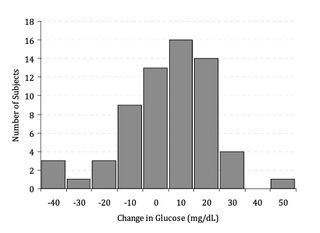
The outlook suddenly changed in 2010. That year, Martin Hagger and colleagues published a meta-analysis that found support for the ego depletion effect but also noticed that people with greater motivation to do a task were less depleted by it. That result raised some eyebrows. If self-control is limited by some hard resource, how much you want to use it shouldn’t make a difference. Around the same time, Robert Kurzban published a critique of the claim that glucose is that “hard resource,” arguing with devastating clarity that it is impossible for even extreme amounts of self-control to meaningfully deplete a metabolic resource.
But the biggest bombshell was Veronika Job’s paper that year, “Ego depletion—Is it all in your head?” With co-authors Carol Dweck and Greg Walton, Job provided good evidence across four studies that ego depletion only happens to people who believe in it. Think willpower runs out with use? Then sure enough it does. Think perseverance is energizing? Then no depletion for you. Job’s data portray the concept of limits on willpower as a self-fulfilling prophecy, or really more of a self-defeating prophecy for those who believe in depletion. The ultimate power of a person’s beliefs over their willpower completely undermines the premise that willpower draws down an inherently limited resource.
For some reason, scientists who should or at least could have known better continued to study ego depletion for a decade following that watershed year. If the admitted use of questionable research practices in the original studies and the shakiness of the empirical findings themselves weren’t enough, the evidence of the role of beliefs, incentives, motivation, and other psychological factors should have convinced people that the premise of a limited resource should be rejected.
To their great credit, some of Baumeister’s collaborators, Kathleen Vohs and Brandon Schmeichel, and others appear to have finally ended this debate. They accomplished this by conducting one of the most thorough and convincing studies I’ve ever seen. This study, to be published soon in Psychological Science, could be a kind of last word on depletion. They talked to a wide range of experts in the field and identified two procedures that everyone thought should create ego depletion. They laid out in advance exactly what their procedures would be and how they would analyze their data, and had the entire plan vetted by outside experts. They recruited 36 labs from around the world and carefully trained them in the procedures. And then they had an independent scientist analyze the data.
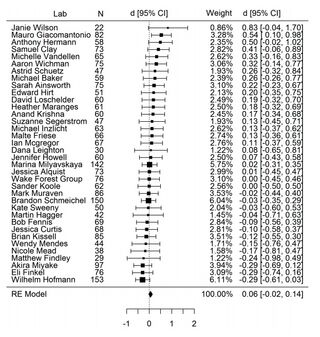
And after all that? Nothing. Engaging in self-control had no detectable effect on performance on a second self-control task. Now even people who helped promote the idea to begin with are ready to give up on it. But the vacuum left in the literature where ego depletion was leaves us in an awkward position. How can we square the palpable intuition that we get tired after exerting effort with this most convincing failure to capture this experience in the lab?
Fatigue is real. Effort is a real sensation, one that can prompt people to give up (sometimes for good reason!). What is wrong is the idea that a boring laboratory task can sap a person’s ability to continue to exert effort later. Motivation is not like fuel in a tank at all. It's more like a story we tell ourselves about why we do what we do. Change the story and you can change the behavior.
There are some brilliant studies on the dynamics of motivation and theories emerging to explain data on effort, motivation, and when and why people can persist long after any purported resource would have been depleted. One of my favorite data points illustrates this elasticity of motivation and the way our expectations guide our beliefs about our willpower. Reuven Dar and colleagues in Israel studied cravings for cigarettes in flight attendants who were smokers. This is an ideal group for studying self-control because they resist cravings for long stretches at a time.
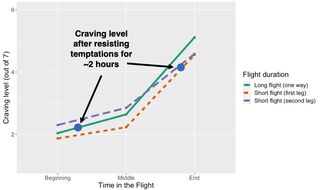
The researchers looked at the timeline of cravings among flights of varying lengths. If resisting the temptation to smoke uses a limited resource, then, for example, the capacity to resist smoking for five hours is more than enough for a two-hour flight, but should only last for less than half of a 12-hour flight. But that’s not how it works. The flight attendants’ craving levels, a rough gauge of their ability to resist temptation, scaled depending on the length of the flight. Craving levels increased throughout the flights, peaking toward the end. But they increased more slowly during the long flights, ending around the same level regardless of the length of the flight. Cravings were much lower two hours into a long flight than they were two hours into a two-and-a-half-hour flight. In this real-world setting, people’s willpower seemed to be determined by their expectations and not their previous efforts to resist temptation.
In recent years, Baumeister has described using many of research practices that we now know can lead to false positives, but at the same time has continued to defend his conclusions. Baumeister is high profile, so he has been the target of a lot of criticism that should more rightly be aimed at the field as a whole. Collectively, we have come to recognize the flaws of widely used research practices, but at the same time we are unwilling to let go of the theories supported by evidence derived from those practices.
It is hard for me to begrudge researchers, including Baumeister, this position, untenable though it is. Replication in another lab long provided the comforting reassurance that a finding was reliable. But magicians can replicate each other’s illusions a thousand times over without making them real. Admitting to ourselves not only that our methods were flawed but also that our theories were wrong equates to accepting that we suffered a series of mass delusions on ego depletion and so many other phenomena. Our fault is that we believed our own magic when we saw others doing the same tricks.
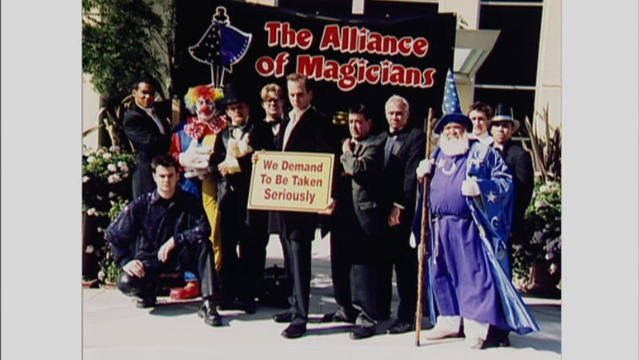
We now have better tools for science and we should use those. I note that there is a lesson in ego depletion about the content of our science as well. When I first spoke to Baumeister about it, the predominant feeling I got from him was one of consternation about why people were so invested in this one quirk within the much larger topic of self-control. He wondered why people kept doing ego depletion studies when there is so much more to learn about self-control.
The fact that people poured so many resources into ego depletion while so much more awaits discovery illustrates a flaw in the way researchers choose their topics. Much as we learn our (at times) flawed methods from others and copy them, so too do we allow others to dictate what we study. This is understandable. It’s easier to follow a model, build on existing research, and use established paradigms than to study something entirely new.

But these behaviors come with an opportunity cost of working on something different and perhaps more important. Did anyone seriously pause to wonder how important ego depletion is? Even if it were real, if you can barely get it to show up in the lab, how much power do you think it has over anyone’s behavior in the real world? The number of studies of ego depletion manifesting in non-lab studies is vanishingly small. If anything, studies of how people actually behave show that willpower has little to do with self-control behavior.
So what is the last thing you need to know about ego depletion? It’s not the methodological progress or even the lesson about motivation being subjective. It’s about how psychologists choose what to study. We end every paper stating that “more research is needed” on this or that topic. The definition of a cliche is something we hear so often we don’t process its meaning. We cease to engage in critical evaluation of a claim. Let's pause and ask ourselves: Is more research needed? Why? The lesson of ego depletion is that, sometimes, we can give up on a topic and move to something else.
References
Baumeister, R. (2019, September 4). Self-Control, Ego Depletion, and Social Psychology’s Replication Crisis. https://doi.org/10.31234/osf.io/uf3cn
Baumeister, R. F., Bratslavsky, E., Muraven, M., & Tice, D. M. (1998). Ego depletion: Is the active self a limited resource? Journal of Personality and Social Psychology, 74(5), 1252–1265. https://doi.org/10.1037/0022-3514.74.5.1252
Baumeister, R. F., & Vohs, K. D. (2016). Misguided effort with elusive implications. Perspectives on Psychological Science, 11(4), 574–575. https://doi.org/10.1177/1745691616652878
Berkman, E. T., Livingston, J. L., & Kahn, L. E. (2017). Finding the “self” in self-regulation: The identity-value model. Psychological Inquiry, 28(2-3), 77-98. https://doi.org/10.1080/1047840X.2017.1323463
Blázquez D, Botella J and Suero M (2017) The Debate on the Ego-Depletion Effect: Evidence from Meta-Analysis with the p-Uniform Method. Front. Psychol. 8:197. https://doi.org/10.3389/fpsyg.2017.00197
Carter, E. C., Kofler, L. M., Forster, D. E., & McCullough, M. E. (2015). A series of meta-analytic tests of the depletion effect: Self-control does not seem to rely on a limited resource. Journal of Experimental Psychology: General, 144(4), 796–815. https://doi.org/10.1037/xge0000083
Carter EC and McCullough ME (2014) Publication bias and the limited strength model of self-control: has the evidence for ego depletion been overestimated? Front. Psychol. 5:823. doi: 10.3389/fpsyg.2014.00823
Dang, J. (2018). An updated meta-analysis of the ego depletion effect. Psychological Research, 82(4), 645–651. https://doi.org/10.1007/s00426-017-0862-x
Dar, R., Rosen-Korakin, N., Shapira, O., Gottlieb, Y., & Frenk, H. (2010). The craving to smoke in flight attendants: Relations with smoking deprivation, anticipation of smoking, and actual smoking. Journal of Abnormal Psychology, 119(1), 248–253. https://doi.org/10.1037/a0017778
Hagger, M. S., Chatzisarantis, N. L. D., Alberts, H., Anggono, C. O., Batailler, C., Birt, A. R., Brand, R., Brandt, M. J., Brewer, G., Bruyneel, S., Calvillo, D. P., Campbell, W. K., Cannon, P. R., Carlucci, M., Carruth, N. P., Cheung, T., Crowell, A., De Ridder, D. T. D., Dewitte, S., … Zwienenberg, M. (2016). A Multilab Preregistered Replication of the Ego-Depletion Effect. Perspectives on Psychological Science, 11(4), 546–573. https://doi.org/10.1177/1745691616652873
Hagger, M. S., Wood, C., Stiff, C., & Chatzisarantis, N. L. D. (2010). Ego depletion and the strength model of self-control: A meta-analysis. Psychological Bulletin, 136(4), 495–525. https://doi.org/10.1037/a0019486
Hofmann, W., Baumeister, R. F., Förster, G., & Vohs, K. D. (2012). Everyday temptations: An experience sampling study of desire, conflict, and self-control. Journal of Personality and Social Psychology, 102(6), 1318–1335. https://doi.org/10.1037/a0026545
Inzlicht, M., Shenhav, A., & Olivola, C. Y. (2018). The effort paradox: Effort is both costly and valued. Trends in Cognitive Sciences, 22(4), 337-349. https://doi.org/10.1016/j.tics.2018.01.007
Job, V., Dweck, C. S., & Walton, G. M. (2010). Ego Depletion—Is It All in Your Head?: Implicit Theories About Willpower Affect Self-Regulation. Psychological Science, 21(11), 1686–1693. https://doi.org/10.1177/0956797610384745
Kurzban, R. (2010). Does the Brain Consume Additional Glucose during Self-Control Tasks? Evolutionary Psychology, 8(2), 244-259. https://doi.org/10.1177/147470491000800208
Kurzban, R., Duckworth, A., Kable, J. W., & Myers, J. (2013). An opportunity cost model of subjective effort and task performance. Behavioral and Brain Sciences, 36(6), 661-679. https://doi.org/10.1017/S0140525X12003196
Milyavskaya, M., & Inzlicht, M. (2017). What’s so great about self-control? Examining the importance of effortful self-control and temptation in predicting real-life depletion and goal attainment. Social Psychological and Personality Science, 8(6), 603-611. https://doi.org/10.1177/1948550616679237
Milyavskaya, M., Inzlicht, M., Hope, N., & Koestner, R. (2015). Saying “no” to temptation: Want-to motivation improves self-regulation by reducing temptation rather than by increasing self-control. Journal of Personality and Social Psychology, 109(4), 677–693. https://doi.org/10.1037/pspp0000045
Munafò, M. R., Nosek, B. A., Bishop, D. V., Button, K. S., Chambers, C. D., Du Sert, N. P., ... & Ioannidis, J. P. (2017). A manifesto for reproducible science. Nature Human Behaviour, 1(1), 1-9. https://doi.org/10.1038/s41562-016-0021
Murtagh, A. M., & Todd, S. A. (2004). Self-regulation: A challenge to the strength model. Journal of Articles in Support of the Null Hypothesis, 3(1), 19-51.
Nosek, B. A., Ebersole, C. R., DeHaven, A. C., & Mellor, D. T. (2018). The preregistration revolution. Proceedings of the National Academy of Sciences, 115(11), 2600-2606. https://doi.org/10.1073/pnas.1708274114
Simmons, J. P., Nelson, L. D., & Simonsohn, U. (2011). False-positive psychology: Undisclosed flexibility in data collection and analysis allows presenting anything as significant. Psychological Science, 22(11), 1359-1366. https://doi.org/10.1177/0956797611417632
Vohs, K. D., Schmeichel, B. J., Lohmann, S., Gronau, Q., Finley, A. J…. Wagenmakers, E.-J., & Albarracín, D. (in press). A multi-site preregistered paradigmatic test of the ego depletion effect. Psychological Science.
Werner, K. M., & Milyavskaya, M. (2019). Motivation and self‐regulation: The role of want‐to motivation in the processes underlying self‐regulation and self‐control. Social and Personality Psychology Compass, 13(1), e12425. https://doi.org/10.1111/spc3.12425
Westbrook, A., Braver, T.S. Cognitive effort: A neuroeconomic approach. Cogn Affect Behav Neurosci 15, 395–415 (2015). https://doi.org/10.3758/s13415-015-0334-y




